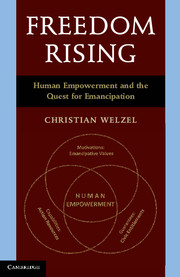Book contents
- Frontmatter
- Dedication
- Contents
- List of Tables
- List of Figures
- List of Boxes
- Abbreviations
- Preface
- Acknowledgment
- Introduction
- Part A Understanding Emancipative Values
- 1 A Theory of Emancipation
- 2 Mapping Differences
- 3 Multilevel Drivers
- 4 Tracing Change
- Part B Emancipative Values as a Civic Force
- Part C Democratic Impulses of Emancipative Values
- Part D Emancipative Values in Human Civilization
- Conclusion
- References
- Index
1 - A Theory of Emancipation
Published online by Cambridge University Press: 05 June 2014
- Frontmatter
- Dedication
- Contents
- List of Tables
- List of Figures
- List of Boxes
- Abbreviations
- Preface
- Acknowledgment
- Introduction
- Part A Understanding Emancipative Values
- 1 A Theory of Emancipation
- 2 Mapping Differences
- 3 Multilevel Drivers
- 4 Tracing Change
- Part B Emancipative Values as a Civic Force
- Part C Democratic Impulses of Emancipative Values
- Part D Emancipative Values in Human Civilization
- Conclusion
- References
- Index
Summary
The power of the people and the power of reason are one.
Georg BuechnerThis chapter establishes the theoretical foundation of my study. I present a human empowerment framework based on an evolutionary theory of emancipation. This is a theory of “emancipation” because it centers on the human desire for an existence free from domination. The theory is “evolutionary” because it derives its description of the human empowerment framework from an evolutionary root principle: the utility ladder of freedoms. This principle starts from an evolved feature universal to our species: human agency – people’s faculty to act with purpose.
Agency is an inherently emancipatory quality that has been selected for its power to shape reality. Agency makes guarantees for freedoms a useful good – to the extent to which people have the resources to access their agentic faculty. To the extent to which this is the case, people recognize the value of freedoms and take action for their guarantee. If this is a correct proposition, then the quest for freedoms is adaptive: it waxes and wanes in response to existential constraints on people’s action resources. Once existential constraints recede, the quest for freedoms awakens and starts to spread, until it has spread wide enough so that people join actions on behalf of their commonly valued freedoms. As this happens, the power of solidarity grows irresistible at some point. Consequently, rulers are forced to guarantee freedoms and pressured to abide by these guarantees. Conversely, if existential constraints persist, the same logic works in the opposite direction: the quest for freedoms remains dormant, no actions in pursuit of freedoms occur, and rulers are unlikely to give guarantees or, if they do so against the odds, can easily circumvent them.
- Type
- Chapter
- Information
- Freedom RisingHuman Empowerment and the Quest for Emancipation, pp. 37 - 56Publisher: Cambridge University PressPrint publication year: 2013



